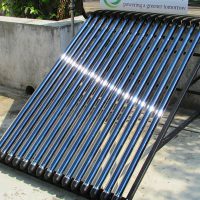What You Need to Know About Solar Water Heaters
Basically, there are two different types of solar water heaters. The first is a stand alone water heater that provides all the hot water for your home. The second is used as a pre-heater to heat the water coming into your existing water heater. The main difference in the two types is that a stand alone water heater will usually have a reservoir to store the heated water and the pre-heater uses the existing water heater as a reservoir.
The part of a solar water heater where the water is actually heated by the sun is called a heat exchanger. The heat exchanger is the key element of the heater and there are many different designs in use around the world today.
A stand alone solar water heater consists of a storage tank to store the heated water, the heat exchanger, and the hoses or tubing to connect them. In some applications a one way valve is installed into the system to prevent the backflow of cold water into the tank, and some systems use a small pump to accomplish this and ensure circulation through the heat exchanger.
When a system can be set up properly, no pump is necessary to accomplish circulation through your heat exchanger as natural convective current will do it for free (since hot water is lighter than cold water and will tend to rise to the top pulling cold water into the bottom as it does), however, if your particular application is such that the heat exchange unit cannot be set on the same level as the storage tank (due to space for the tank and an appropriate place with available sunlight for the heat exchange unit), you may have to use a small pump to ensure circulation through your system. For a truly off grid system, you can use a small 12 volt pump and power it with a solar panel. No battery is needed because the solar water heater only works when sunlight is available just like the solar panel.
The pre-heater type is tied into the cold water supply line to your existing water heater. The way it works is to pre-heat the water coming into your water heater so it does not have to work as hard as normal and sometimes, not at all. Water that is already hot does not need as much heating, sometimes none at all. This is a good way to save on the part of your energy bill that is used to provide hot water for your home while leaving your existing water heater in the system to ensure a supply of hot water on cloudy days or other conditions where your solar water heater does not work as well.
This type of solar water heater consists of a heat exchange unit, the lines connecting it to the cold water supply and your water heater. A pump is not required here because the pressure of the incoming water will accomplish the circulation through the heat exchanger.
These units work especially well in the summertime but provision should be made to protect the outside parts from damage resulting from freezing in the winter. Usually the heat exchanger and lines going to and from the house are the only outside parts and can be drained.
These are the two basic types of solar water heaters in use all over the world, today. They can be as simple in design as a garden hose lying in the sun, or as complex as you want to make it with copper or PVC tubing in a sealed box and temperature activated one way valves and pumps.




